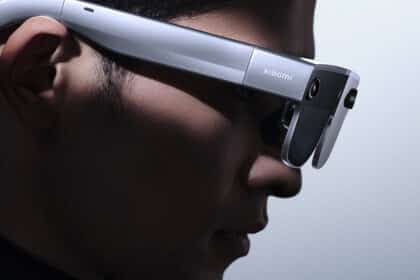In its pair of AR glasses, Xiaomi has used a pair of MicroLED screens that offer a peak brightness of 1,200 nits.
Augmented Reality (AR) is likely to be the next big transition for big-tech companies, especially those working in the smartphone and tablet industry. During the recent Mobile World Conference (MWC) in Barcelona, the Chinese smartphone giant Xiaomi unveiled a new prototype of its Wireless AR Glass Discovery Edition.
This new AR wearable device from Xiaomi is very lightweight at just 126 grams. The Chinese tech company managed it by using lightweight materials like carbon fiber, magnesium alloy, and a self-developed silicon-oxygen anode battery.
Additionally, Xiaomi also said that it features a “retina-level” display. In its pair of glasses, Xiaomi has used a pair of MicroLED screens that offer a peak brightness of 1,200 nits. Besides, they also feature free-form light-guiding prisms to recreate an image.
Xiaomi AR glass display features 58 PPD (pixels per degree). At 60 PPD, humans can’t perceive individual pixels which brings it much closer. Furthermore, to easily adjust viewing in different light conditions, the Xiaomi AR Glasses feature electrochromic glasses. Moreover, these glasses also come with a complete blackout mode thereby offering a fully immersive experience and making them work partially like VR headsets.
The Xiaomi Wireless AR Glass Discovery Edition will connect wirelessly with smartphones such as a Xiaomi 13 Series phone or other Snapdragon Spaces-ready phones like the OnePlus 11. In order to achieve full link latencies as low as 50ms, Xiaomi uses its own communication links.
Xiaomi AR Glass Hardware and Processor
The Xiaomi AR Glasses come with Qualcomm’s Snapdragon XR2 Gen 1 chip. Noted that there’s no onboard storage. Thus, we need to connect them with some host device like a smartphone. The augmented reality (AR) glasses from Xiaomi will receive support from the Snapdragon Spaces XR development platform to run different applications.
As per Xiaomi, using Mi Share’s application streaming capability, users of the AR Glasses can watch content through YouTube and TikTok. Besides, users can rely on gestures to move around the interface and also interact with real-life objects.
The Xiaomi AR Glass will also allow users to turn on or turn off a smart lamp as well as “grab” a screencast from the TV to the glasses using gestures.
Note that still is still a prototype and the AR glasses need some more testing in a real-world scenario. Smartphone companies have continued to show their AR Glasses. Tech giant Apple is also reportedly working on one such device.
Bhushan is a FinTech enthusiast and holds a good flair in understanding financial markets. His interest in economics and finance draw his attention towards the new emerging Blockchain Technology and Cryptocurrency markets. He is continuously in a learning process and keeps himself motivated by sharing his acquired knowledge. In free time he reads thriller fictions novels and sometimes explore his culinary skills.



